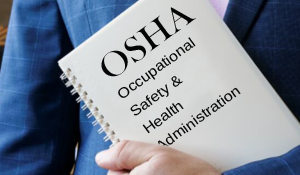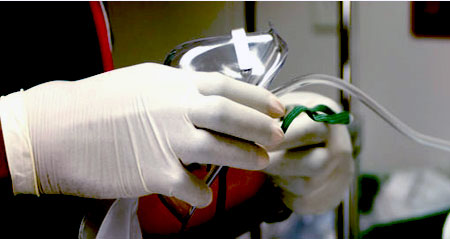HQAA designed their application and accreditation processes to be user friendly. Achieving accreditation, especially for a new startup organization, can be stressful as a company navigates what can seem bureaucratic and complicated waters in pursuit of their accreditation. But, never fear: HQAA has set up easily accessible resources to smooth those processes and guide your organization.
HQAA Blog
Helpful Resources: How the HQAA Website Can Be Your BFF
Topics: Renewing Accreditation, HQAA Accreditation, HME Accreditation Requirements, Avoiding Deficiencies
I’m not going to name names, but many years ago, as a young surveyor, I was inspecting delivery vehicles at a place (the location will remain unnamed) and observed one of the worst safety hazards I ever saw in my career. A delivery technician who covered a two-state territory had been in the adjacent state where fireworks were legal, and decided to stock up for the
Topics: HME Accreditation Requirements, Avoiding Deficiencies, Delivery, Oxygen, Equipment
Calendar year is a very predictable January 1-December 31 each year. With very few exceptions, this is “the year” and most folks say “Happy New Year” on January 1st. The exception to that is in the world of business—where there are arcane and unusual, but well thought out, differences and exceptions.
Topics: Quality Improvement, Quality Standards, Process Improvement, Avoiding Deficiencies, Disaster Preparedness, Business Practices, Equipment
Accreditation documentation requirements for the human resource files are relatively straightforward, yet the human resource (“HR”) standards continue to be some of the most frequently cited standards and generate the most questions from DME customers. HQAA’s recent standards revisions and updates included several of the HR standards. This fact, along with the continued questions and citations for HR standards suggest it was time to revisit the personnel file and review expectations.
Topics: Employee Training, Personnel Files, Renewing Accreditation, HQAA Accreditation, HME Accreditation Requirements, Avoiding Deficiencies
In our January 2022 blog, we talked about fraud, waste, and abuse and touched on compliance programs. The article prompted questions and comments from quite a few organizations and questions of late suggest it might be a good time to do a deeper dive on compliance programs.
Compliance “programs” are sets of policies & procedures specifically designed to help an organization adhere to law and regulation. These policies and procedures are specifically set up to detect, prevent, and correct fraud, waste, and abuse. Medicare requires any provider to have such a program and they have very specific content they want these policies to contain.
Topics: Security, Billing, HQAA Accreditation, Compliance, Avoiding Deficiencies, Complaint Process, Business Practices, Marketing, Surveys, OIG
Those of us who have been in the DME industry for enough years remember when every DME organization in the country had a storage room full of vertical files and/or bank boxes full of old patient records. The boxes were stored in piles, often piled up to the ceiling. Usually there were labels or writing on the boxes—something like “April 1987-January 1988” or “1990—A-L”. The boxes and filing cabinets were full of manila and Pend-a-flex folders labeled with patient names and chock full of medical records, billing information, social security numbers, dates of birth, and enough demographic information to make a telemarketer’s day.
Topics: Personnel Files, HQAA Accreditation, HME Accreditation Requirements, Patient File Requirements, Avoiding Deficiencies
Nothing strikes fear into the hearts of DME owners, managers, and staff more than the Office of the Inspector General (the “OIG”). The fear is perhaps deserved by an extremely small handful of industry people. The vast majority of our industry rank and file have nothing to fear from this sometimes maligned and misunderstood government agency.
Topics: Billing, HQAA Accreditation, HME Accreditation Requirements, Compliance, Avoiding Deficiencies, CMS, Business Practices, OIG
Many durable medical equipment company employees equate “OSHA” with those plasticized posters typically hung in a breakroom or kitchen in the organization. Training requirements by both accreditation standards and OSHA itself have gone a long way to educating employees about the various OSHA mandated requirements and led to a better understanding of OSHA. This in turn has led to better adherence to the rules and regulations and ultimately to a safer workplace.
Topics: Employee Training, HQAA Accreditation, HME Accreditation Requirements, Compliance, Avoiding Deficiencies, Showroom, Retail, Delivery, Warehouse, Infection Control
Imagine how hard it would be to adequately assess whether a person could do some specific task (such as teach school, perform surgery, re-wire a house’s electrical system, or build a bridge) without actually observing them doing that task. We hire employees based on applications and resumes, we evaluate their performance in a job by checking their attendance record to insure they show up to work on time, and we monitor a delivery person’s driver’s license or a clinician’s clinical license to make sure they haven’t expired or been revoked. But no tool works as well to assess a person’s ability to do their job as well as actually watching them do their job. Competency assessments are an integral part of the evaluative process and some would say, THE most important part of that process. If you are hiring a marksman for their ability to hit a target, at some point, you’re going to go out into the field and say “Show me what you’ve got!”
Topics: Employee Training, Renewing Accreditation, HQAA Accreditation, Avoiding Deficiencies, Delivery, Clinical Respiratory Services, Competence, DMEPOS
Surveyors for all the accrediting organizations are back on the road now, surveying up a storm and working to catch up the backlog of new customers and ongoing customers who were scheduled for survey in that March to July 2020 time period. It’s good to be back doing what we love, even with some accommodations and new processes in place.
Topics: Employee Training, Renewing Accreditation, HME Accreditation Requirements, Avoiding Deficiencies, Competence, Surveys











